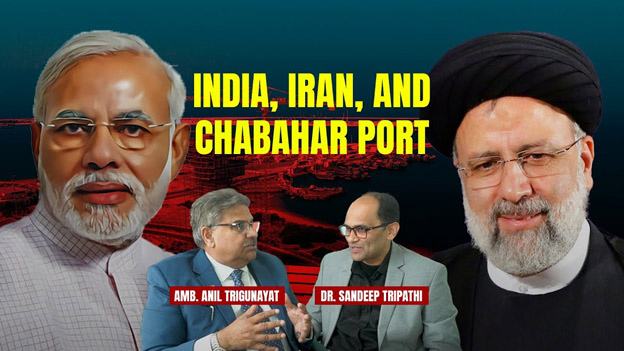The podcast episode titled “Ambassador Anil Trigunayat, (IFS, Retd) on India, Iran and Chabahar Port” was hosted by Forum For Global Studies, a Delhi based multidisciplinary thinktank. Dr Sandeep Tripathi moderated the session and the talk featured Anil Trigunayat, IFS (Retd), a noted expert on West Asia, Russia and Africa. The discussion focused on India, Iran and Chabahar Port.
Dr Tripathi began the discussion by introducing Ambassador Anil Trigunayat and welcoming him on the podcast. Dr. Tripathi explained the history of China-Pakistan dynamics surrounding the Gwadar Port, which subsequently led India to shift its focus to Iran’s Chabahar Port. He opened the podcast by questioning the strategic importance of Chabahar Port for India, the leverage it provides India in regional politics and the long time taken for its conception. Mr Trigunayat supported his answer by stating the role of bilateral ties in conceiving a strategic project and also about the India-Iran-Russia joint venture for building the North-South corridor. He discussed the role of the USA in the delays in completing the project, citing the sanctions imposed on Iran by the USA, which have affected not just Iran’s interests but also India’s. He explained the strategic importance of Chabahar port for India, providing connectivity to the Middle East as well as Central Asia. He cited the example of India sending humanitarian aid to Afghanistan via the Chabahar Port, while Pakistan denied access through the Gwadar Port, highlighting its strategic importance and Iran-India strategic partnership.
Mr. Trigunayat mentioned the delay in the IMEC project, resulting in Chabahar Port being India’s only viable option for connectivity to the Middle East. Dr. Tripathi discussed the strategic leverage that the Gwadar Port provides China in the Strait of Hormuz, contrasting it with the advantage India would have with the Chabahar Port in the region. He questioned why India doesn’t demonstrate the same level of strategic autonomy in its dealings with Iran as it does with Russia. Mr. Agha responded by pointing out the exemption of Chabahar Port from American sanctions and the waivers India received for importing oil from Iran. However, he noted that this situation changed after Donald Trump became President of the USA, thus affecting the oil business between both nations. He clarified that both nations have now reached a deal to address the issue.
He explained the strategic and friendly relations that India and Russia have shared in the past, which gives India leverage in maintaining its ties with Russia compared to Iran. Dr Tripathi raised concern for Indian policy makers over the increasing ties between Iran and China and the existing Iran-China-Russia axis. Mr. Trigunayat highlighted the ongoing threat that China poses to India in the Middle East and Central Asia as it seeks to establish a strong presence in the region’s politics. He elucidated the role of China and Iran in providing Russia a strong hand in its rivalry against the USA. He discussed the differences between India and China and highlighted the leverage India has due to its growing economy, market size, and large population.
He elaborated on India’s role in the political landscape among superpowers and the advantages, national interests it gained from the rivalry between these major powers. Towards the end of podcast Dr Tripathi questioned over the attacks on the merchant ships sailing through Red Sea and the concerns it raises for India with the involvement of Houthis, as raised by India’s External Affairs Minister S. Jaishankar in his visit to Iran. Mr Trigunayat concluded his thoughts by stating the attacks in the Red Sea concerning not just India but also for the world with 12% of global trade flowing through it. He emphasized India’s role in not only protecting Indian merchant vessels but also those of other countries. Dr. Tripathi concluded the discussion by elaborating on the historical friendship between Iran and India and the strategic partnership that both nations share.

